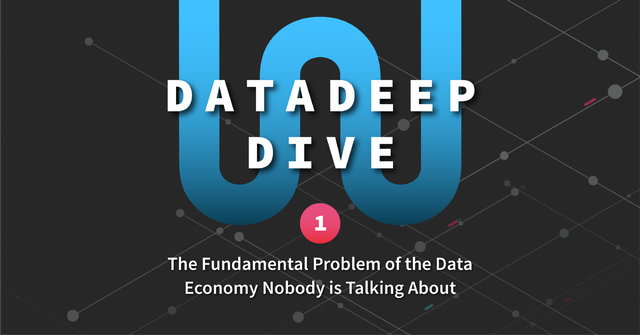
This is part 1 of the Data Deep Dive series which focuses on data as an asset, data marketplaces (e.g. DataWallet, IOTA Data Market and our own DX Network) and how blockchain technology is making the data economy a reality.
Data is the new oil
The world’s most valuable resource is no longer oil, it is data [The Economist]. In the Information Age, data powers growth and change, increasing quality of life and paving the way for fairer and more efficient societies.
For instance, In healthcare, data is used to predict epidemics, prevent disease, and improve treatments [Forbes]. Governments use data to implement projects where they are most needed, by knowing for example where new schools should be built or new bus lines created [Citymapper]. In fact, from climate to artificial intelligence, virtually all areas of modern society would be positively impacted by better access to data [World Economic Forum].
This also creates major economic opportunity around data. It is estimated that the data economy in the EU alone had a value of almost €300 billion in 2016 and is projected to more than double by 2020 reaching €739 billion [European Commission]. Globally, it is estimated that better access to data can help unlock at least $3-5 trillion in global economic value [McKinsey]—that represents an increase of 2–5% of the gross world product!
Data is hard to trade
If the value of data is clear and its potential so immense, why hasn’t the data revolution happened yet? Why are we still waiting on promised data-driven innovations and game-changing societal transformations?
For three simple reasons.
- Most data exists in unrefined (or unstructured) form and it is non-trivial to convert it into structured data, the format needed for use in software.
- Data owners use incompatible data models to structure their data which is kept in isolated silos although often sought-after by others.
- No one has figured out how to price and exchange data efficiently yet.
In short, there are no standards or platforms to make data exchange a smooth process like stock markets do for shares—which is crazy—since data is set to become this century’s most valuable asset.
As a result, trading data is tedious. It is often so expensive, inefficient, and legally cumbersome that organizations prefer to avoid trading data altogether [Gartner; The Economist].
And this is the fundamental problem of the data economy nobody is talking about:
"until we create the infrastructure and incentives needed for data owners and collectors to make their data available to others we won’t unlock the data economy’s full potential."
Creating an open market for data
Historically, the best way to connect supply and demand are open marketplaces. They provide the infrastructure and create the incentives for exchange by allowing parties to freely buy and sell resources from each other.
The issue with data is that creating an open marketplace for it presents a unique set of challenges as it is an intangible non-rival asset unlike virtually all things which are commercially traded today.
That is to say, once data has been acquired it can be shared with another party for free which creates a paradox in the traditional scarcity-based methods for pricing resources—amongst many other issues.
The next Data Deep Dive further explores open data marketplaces, their practical applications and why blockchain is the key technology that has been missing to make open data exchange a reality.
Thanks for reading! Be sure not to miss our next post on the data economy, data marketplaces & blockchain by clicking on the follow button! 🤓
Original publication on Hackernoon.
This is our first post on Steemit—very cool platform, curious to see how it compares to Medium (which we usually use).
P.S. feel free to ask any questions about data and/or data marketplaces etc. (I wrote the article 😊).
Downvoting a post can decrease pending rewards and make it less visible. Common reasons:
Submit
Hi! I am a robot. I just upvoted you! I found similar content that readers might be interested in:
https://hackernoon.com/the-fundamental-problem-of-the-data-economy-nobody-is-talking-about-dfcaa31546c1
Downvoting a post can decrease pending rewards and make it less visible. Common reasons:
Submit
Congratulations @thedxnetwork! You received a personal award!
You can view your badges on your Steem Board and compare to others on the Steem Ranking
Do not miss the last post from @steemitboard:
Vote for @Steemitboard as a witness to get one more award and increased upvotes!
Downvoting a post can decrease pending rewards and make it less visible. Common reasons:
Submit